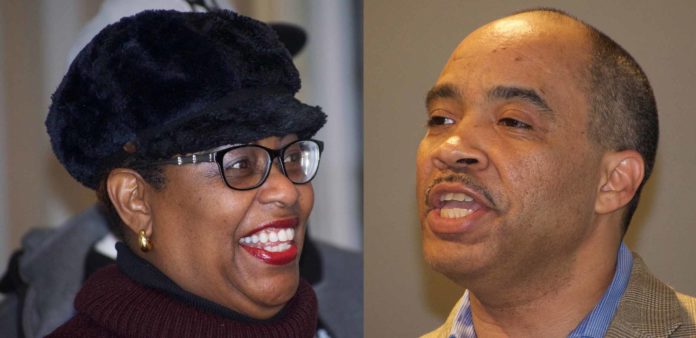
Cardell Orrin, Rosalind (Roz) Withers and Kamilah Turner each grew up in home environments where civic engagement was a norm that affected their childhood and helped shaped who they are as adults.
With Hattiloo’s upcoming play “Sunset Baby” as the backdrop, each was asked to draw from those experiences for “Children of Revolutionaries Speak,” a free panel discussion set for Thursday (January 11) at the theatre.
The play, which runs Jan. 12 through Feb. 11, pivots on Nina, a smart and sexy hustler, who has rejected everything her parents fought for in the Black liberation movement. When her estranged father, Kenyatta, wants to reconcile, negotiating her past and present becomes a revolutionary act.
Intrigued by the “Sunset Baby” storyline, I seized the opportunity to do a story on the panelists, fully expecting what now is the norm for me as a TSD columnist – learning something new about our city’s history and the wonderful souls that call Memphis home.
And while I connected with Cardell and Roz, Kamilah’s presence was demanded elsewhere. Kamilah is a lawyer. Her mother, Elaine Turner, part of the Lee family that often is described as the most arrested family in Memphis during the local desegregation efforts, continues her hospital recovery after a seriously challenging illness. I am among the many sending tons of well wishes to Kamilah’s mom and the family that brought us Memphis Heritage Tours and the Slavehaven Museum.
I have known Cardell for years but had no idea the extent to which his parents were involved in “the movement.” I also had no idea that my mom knew his dad, Cardell Jackson, from Melrose High School.
Cardell’s mom is Sue Jackson, who I (respectfully!) call “White Panther.” She is now, ironically, organizing a social action group called the “Grey Panthers.” This lady has to be the wokest white woman walking by my estimation. She has been active since college, where she worked on anti-apartheid projects in the 80s.
Her work brought her to the MV area and then to Memphis, once she coupled with Cardell’s father.
“As a child you dislike going to all the meetings but you come to accept it as the norm,” the younger Cardell told me. “There’s a part of it that becomes a part of you. It’s hard to run away from. When I came back to Memphis, (civic engagement) was what I did, even before I had a child.
Cardell got involved with the school board. His father had been very active in the fight for black representation on the school board via The Mobilizers. He played an integral role in orchestrating Black Mondays, which were weekly walkouts in protest of the all-white school board. Over 67,000 students participated, some teachers and one administrator, Willie W. Herenton (cause he’s him). That engagement led to the first black board members.
Cardell knows his mother as a quiet force that has been a key player in the fight for social justice.
“You learn a lot by the example that’s set,” he said. “Sue has always said if there’s something to be done, she’s gonna find a way to do it,” Cardell says of his mother.
Admittedly, he still is trying to understand how his mom fed three kids, made all of those meetings and got all of them where they needed to be. Now he’s actively engaged and time challenged as Memphis City Director for Stand for Children and a father. But as I see it, he’s nailing it (alongside my dear friend and his wife, Nefertiti).
Rosalind (Roz) Withers’ experience as a child of a well-known activist unfolds in a much different way. Since 2011, she has been the president/CEO of the Withers Collection Museum & Gallery on Beale St. Her father, Ernest C. Withers, documented the movement with photos that now are storied, iconic and globally celebrated.
While her father routinely took her brothers (seven of them) with him, she said, “I was not a part of the movement unless my mom went.” And such occasions only were when the elder Withers gave the all clear on safety. Her window into the world was primarily through her father’s camera lens. He would bring home photos that would be the topic of family discussion.
These were the images that would eventually find their way into publications such as the New York Times, Time Magazine and Life Magazine, oftentimes with the photo credit attributed to someone else. But her dad was smart, shooting with three or four different cameras, knowing one roll would be sold, leaving him ownership of photos as well.
“I just don’t want my living to be in vain,” is a thought she heard him utter often. It sticks with her as a guiding principle.
“His body of work is unbelievable. The volume is astounding. It is my responsibility to make this history available to all people,” she said. “It’s American history that must not be erased.”
Dr. King’s associate, Andrew Young, former Atlanta mayor and U.N. ambassador, helped her put here father’s legacy in perspective.
“Andrew Young told me that without my father’s work the movement would not have progressed. He (Withers) put the truth in the faces of those who wanted to ignore it. And he did so very early on.”
As a photojournalist, her father covered the Sumner, Miss. murder trial of Roy Bryant and J. W. Milam, who were accused of beating the 14-year-old Emmet Till to death after Till allegedly had moved on Bryant’s wife at a grocery store in Money, Miss. The brutal nature of Till’s murder and the two men’s subsequent acquittal often is cited as a spark to the Civil Rights Movement. In 1955, Withers self-published a booklet about Till, writing on the front cover that he chose to do so in the interest of social justice.
Wither’s boldness is part of his legacy and it lives on through his children. Ernest Jr. worked in the administration of President Carter administration and at one point, five of the family members held an elected political office. At Withers’ side was his wife of 66 years, Dorothy Withers. With her husband often working or travelling, she made sure there was cohesion and stability and that his presence was still felt.
One of the endearing memories Roz shared is the family tradition of Saturday breakfast. Her mom would make a huge breakfast and then family and friends dropped in. It was a big to-do. No matter what, Mr. Withers was there, even if it meant skipping out on a big assignment.
Today, the Withers Collection Museum & Gallery continues to digitize and memorialize Withers’ works, with a big announcement to come soon. Roz says, “We’ve only just begun!”
(The panel discussion is set for 6 p.m. to 7:15 p.m. on Thursday. Attendees will be able to purchase a $10 ticket to preview the play “Sunset Baby.” For more information, visit www.hattiloo.org.)



